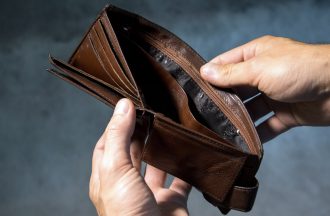
A bad credit rating can have a significant impact on how you live your life. With a bad credit rating you are not only bad news to lenders, you could find yourself having trouble renting property, getting a phone contract or even a job.
So, what exactly is a credit score and how does a bad rating play out in your everyday life?
What is a credit score?
A credit score, also known as a credit rating, is a tool used by lenders to test whether you qualify for a loan, credit card, mortgage or other financial products. A credit score is essentially a three-digit number that is calculated from your credit report. It is essentially a measure of your creditworthiness.
What is a credit report?
Your credit report is a record of any credit you have had in the past and how you have handled it. Your credit report will include information on past and present credit cards, store cards, personal loans, any hire purchases (such as a car, or sofa), overdrafts, mortgages and mobile phone contracts.
Your credit report is compiled by companies known as Credit reference Agencies (CRAs). There are three main CRAs in the UK; Callcredit (about to be acquired by TransUnion), Equifax and Experian.
The credit score you get from each agency may vary and not all lenders use all three agencies. According to MoneySavingExpert it is possible to increase your acceptability by picking a lender using a different agency. See which lenders use which agencies here.
What is a good credit score?
Credit scoring varies between the different agencies. An excellent credit score falls between 961 and 999. A bad credit rating has a score of between 0 and 279. If your score is within this lower range it is likely you will be declined credit or face higher interest rates on borrowing.
What factors affect your credit rating?
Various factors on your credit report can cause your credit score to change. These include:
- Total debts and available credit
- Credit account payment history
- Credit searches (each time a credit application is made it can have a negative impact on your score)
- Public records (the electoral roll and county court judgements)
How does a bad credit rating affect you?
If you have been frivolous with your credit cards and have been ignoring your debts, the likelihood is your credit rating will have plummeted. Missing credit card payments and wracking up debt can affect you in more ways than you think. Here are some of the ways you may be affected:
1. Getting a loan may be more difficult
With a poor credit history, you may not be able to get a loan from your bank. If you can get a loan, the amount you are able to borrow may be lower and the interest rate higher than if you had a good credit score.
While it’s not a good idea to get into debt, there will be times in your life when you may need to borrow money. Perhaps you need a car to travel to work, or your home needs a necessary improvement, such as a new bathroom or kitchen.
With a bad credit rating you will find it more difficult to borrow money, especially at low interest rates. If it’s not possible to improve your credit score, you may still be able to get a loan from a lender offering ‘bad credit loans.’
It’s important to shop around as bad credit loans will come with higher rates and lower limits. There are a number of lenders offering affordable loans to those with a poor credit history. Steer clear of payday lenders who charge extortionate interest rates.
2. Difficulty renting property
Whenever you rent a property your landlord will check your credit file. Landlords can only carry out a soft search without your permission so won’t have access to the same information that lenders do. They can, however, see any court information relating to past missed payments. Your electoral roll status will also show up on the soft search.
While occasional missed payments or a lack of credit history won’t show up on a landlord’s search, any adverse court information will and that could stop you from renting.
3. You may not be able to get a phone contract
Mobile phone companies also check your credit rating. They want to know you will be able to keep up with the monthly payments when you take out a contract with them. While there are no-credit-check mobile contracts out there, they often include an outdated mobile phone model. To get the phone you want you will need to improve your credit score.
4. You may be turned down for certain jobs
According to financial website This is MONEY.co.uk, in the year to July 2017, a whopping 1,923 applicants were turned down for work as a direct result of bad debt.
Employers recruiting into the financial services sector commonly look into applicants’ financial backgrounds. Many other employers also check the credit rating of job applicants as part of their routine background check. Some also check credit histories before agreeing a promotion.
Those applying for roles as doctors, nurses, midwives, care workers, teachers, teaching assistants, youth workers, security officers, HR employees, engineers and recruitment consultants may come under financial scrutiny before being offered a job.
How can you improve your credit rating?
There are several things you can do to improve your credit rating (or credit score). First of all, check your credit report. You can do this for free with Experian. UKCreditRatings also offer a free 14-day trial, but you’ll need to remember to cancel it before the trial expires, or you will get charged £19.95 per month.
If you have a bad credit score, there are things you can do to improve it. Check out these 9 steps to score better on your credit rating.








